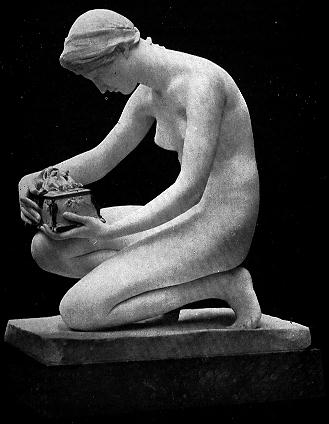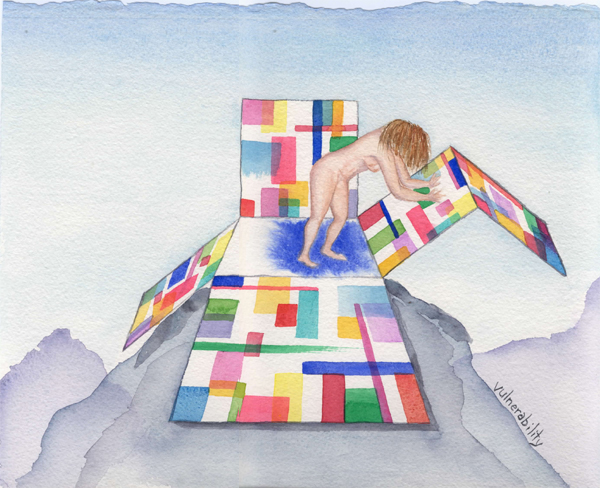Story of Evolution/Evolution of Stories
Bryn Mawr College
March 21, 2004
Eugenides' Ideas (Dangerous and Otherwise), Continued....
Trying to figure out where to re-start the story
(as well as how to "end" it....?)
Today is Paul's birthday
...in honor of which, we could study him studying HIS origins:
Or perhaps we should look again @ metamorphosis
on both larger and smaller, cosmic and biologic, scales?
Actually, between the telescopic and the microscopic is another set of lenses...
...which are the ones I want to use today.
Let's look @ the text.
Looking @ the text, what I saw--through my own lens, as a Christian--
(and we cannot but see through our own lenses) was Easter.
I first noticed an "Easter theme" in the novel when
Milt interrupts his Easter egg-cracking ritual
("Time out. That's my egg. Nobody touch it until I come back" --p. 16)
to inseminate Tessie.

From Greek Orthodox Easter
What do you know of the story of Easter?
Was it told to you, growing up?
How was it told to you?
How do you now tell it?
Like the story of the tsunami, like all stories,
the story of Easter can be read in a catastrophic or a continuous style:
catastrophists might emphasize death, followed by the miracle of life resurrected,
continuists might emphasize the coming of spring, after winter--
"Now the Green Blade Riseth"
I want to suggest that this story, of continuous re-birth, is Cal's story--
and with it, to suggest that literary stories may differ from scientific ones,
in that the new do not replace (though they may alter and update) the old (?)
That we acknowledge our historical roots, in a way that science's stories, with their emphasis on replaceability, do not?
(Is that "less wrong"? That we are more "conservative," less "radical" in our storytelling style?
Is that one source of different storytelling preferences?)
And where are the social scientists on this spectrum?
At the end of this wounded, dishonest season, as the first crocuses appeared, returning from their winter in the underworld, Calliope Stephanides...also felt something stirring in the soil of her being (320).
For that spring, while the crocuses bloomed, while the headmistress checked on the daffodil bulbs in the flower beds, Calliope, too, felt something budding....A kind of crocus itself, just before flowering. A pink stem pushing up through dark new moss....I'd feel a thaw between my legs, the soil growing moist, a rich, peaty aroma rising, and then...the sudden, squirming life in the warm earth beneath my skirt. To the touch, the crocus sometimes felt soft and slippery, like the flesh of a worm. At other times it was as hard as a root (330).

Georgia O'Keefe, Abstraction Blue, from Kara Meister's Website
The emergence of the crocus one of the many images of biological evolution which fill the novel:
...most of the other girls in my grade began to undergo their own transformations...behind our teacher's back, in our desks, we are flying through time....Nature is making its preparations. Deadlines encoded it the species are met. Only Calliopse...is..stalled somehow, so that she's the only one who takes in the true extent of the metamorphoses around her....(285-286).
...in locker rooms....The swampiness, the nudity bring back original conditions....On I came...gaping...at the fantastic underwater life all around me. Sea anemonies sprouted from between my classmates' legs....Higher up, their breasts bobed like jellyfish, softly pulsing, tipped with stinging pink. Everything was waving in the current, feeding on microscopic plankton, growing bigger by the minute
(295-297).
In the basement bathroom was a time frame I felt much more comfortable with...the slow, evolutionary progress of the earth, of its plant and animal life forming out of the generative, primeval mud. The faucets dripped with the slow, inexorable movement of time (328).
I lifted my face up out of the water and so was unaware of the eyes studying my mollusk....The surface of the sea is a mirror, reflecting divergent evoltuionary paths. Up above, the creatures of air; down below, those of water. One planet, containing two worlds (484).
Cal's story is a story of his emergence from an amorphous/amphibious state--
The adolescent ego is hazy thing, amorphous, cloudlike. It wasn't difficult to pour my identity into different vessels....I was able to take whatever form was demanded of me. I only wanted to know the dimensions (434).

But a kind of swish, like a frog kicking off from a muddy bank. My heart, that amphibian, moving that moment between two elements; one, excitement; the other, fear (265).
--to become "essentially a creature of air"(484):
...in the early seventies...everybody wanted to go unisex....But then another thing happened. It was called evolutionary biology. Under its sway, the sexes were separated again....Men and women, tired of being the same, want to be different again....My life exists at the center of this debate. I am, in a sense, its solution....I don't fit into any of these theories....In the twentieth century, genetics brought the Ancient Greek notion of fate into our very cells. This new century we've just begun has found something different....free will is making a comeback. Biology gives you a brain. Life turns it into a mind (478-479).
What we learned about "mind," a few weeks ago,
from Paul's talk on the bipartite brain (part of his elaboration of Dennett's Dangerous Ideas), was that the human brain consists of a frog brain surrounded by a large amount of neocortex....The upper module is distinctive in having the ability to notice...patterns and...to conceive organizations other than those that can be derived from patterns of activity available to the lower module....The upper module creates "stories", ie coherent abstractions... and a capacity to conceive counterfactuals which in turn may bring into existence new material entities in the outside world....The brain consists of an "idealist" sitting on the back of a "pragmatist".
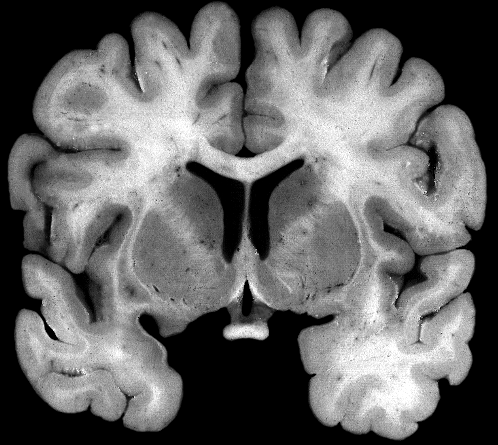
What do these words mean?
What is an idealist?
What is a pragmatist?
Which is Callie? Which is Cal?
What is the function of consciousness--and of its lack--in the novel?
I, even now, persist in believing that these black marks on white paper bear the greatest significance, that if I keep writing I might be able to catch the rainbow of consciousness in a jar (297).
Consciousness allows us the possibility of viewing ourselves from the outside, or choosing not to:
| The mind self-edits. The mind airbrushes. It's a different thing to be inside a body than outside. From outside, you can look, inspect, compare. From inside there is no comparison....Outside had ended. There was nowhere to go that wouldn't be me (387, 473). |
Under...sedation Tessie withdrew into an inner core of herself, a kind of viewing platform from which she could observe her anxiety....There was a place halfway between consciousness and unconsciousness where Tessie did her best thinking (465). |
Where do you do your thinking?
What is the role of the unconscious in that process?
Living unconsciously can be sad.
It may also open us to new possibilities:
|
Lefty was confronting the possibility that consciousness was a biological accident...he'd always believed in the soul, in a force of personality that survived death. But as his mind continued to waver, to short-circuit, he finally arrived at the cold-eyed conclusion, so at odds with his youthful cheerfulness, that the brain was just an organ like any other and that when it failed he would be no more....the hard disk of his memory slowly began to be erased, beginning with the most recent information and proceeding backward.... (263). |
Had she had all her wits, Desdemona could not possibly have fathomed what I was saying, but in her senility she somehow accommodated the information. She lived now amid memories and dreams, and in this state the old village stories grew near again....he eyes had gone dreamy. She was smiling. And then she said, "My spoon was right" (526). |
Milton no longer had any brain waves....now he had done this, the stupidest thing ever....."Birdbrain," Milton said, to himself....And then the water claimed him (511).
But, as we learned recently, "Birdbrain" No Longer Means "Stupid."
Birds are smarter than we thought. So too is Cal.
The cultural evolution of his story began w/ the blind Greek prophet Tiresias
who was given second sight:
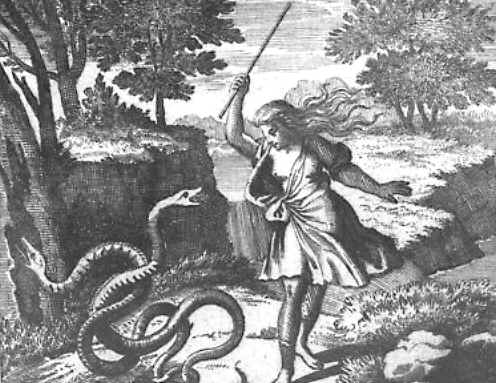
From OVID: METAMORPHOSES, BOOK III
Already latent inside me...was the ability to communicate between the genders, to see not with the monovision of one sex but in the stereoscope of both (269).
...the play...was Antigone....I was a shoo-in to play the old, blind prophet. My wild hair suggested clairoyance. My stop made me appear brittle with age. My half-changed voice had a disembodied, inspired quality (331).
As I Iooked, I didn't take sides. I understood both the urgency of the man and the pleasure of the woman. My mind was no longer blank. It was filling with a dark knowledge (435).
Many cultures on earth operated not with two genders but with three. And the third was always special, exalted, endowed with mystical gift. One cold drizzly night i gave it a try...I tried to fall into a trance state...but nothing happened. As far as special powers went, I didn't seem to have any. A Tiresias I wasn't (495).
What would you say, if I said that Tiresias becomes, in the course of cultural evolution, Christ?
And that Christ is the archetypal teacher and disseminator ?
"And I Tiresias have foresuffered all / Enacted on this same divan or bed"
(T.S. Eliot, The Wasteland, ll.243-244).
When you travel like I did, vague about destination and with an open-ended itinerary, a holy-seeming openness takes over your character. It's the reason the first philosophers were peripatetic. Christ, too (488-489).
(Cf. The World, the Text and the Critic, 1983, in which Edward Said makes exile the image of the intellectual: the "ascetic code of willed homelessness . . . a good way for one who wishes to earn a proper love for the world.")
Christ is "open," peripatetic, "disseminating."
He is also all-seeing:

From Travel in Sicily
In his
3 a.m. interview about the novel, Eugenides was asked,
"If you would pick an image that reflects the spirit of Middlesex, what would it be?"
...the only...visual artifact that I had to the book was actually the interior of a Greek Orthodox Church. They are very gaudy in many respects, iconography on all of the walls. There's a lot of activity in the same way there's a lot of activity in Middlesex and in all of the characters. There are very bright spots and there's also many dark spots where you have the lamps swinging, smoking and a litany of pray....There usually is also a dome, and across the dome you'll find the Christ Pantocrator, who's transcendent, looking down on the partisans and on creation. In a way, I think my narrator as a Christ Pantocrator. So, the idea of something very colorful and swirling with light, with a dominant intelligence screening over, was the image that I had in my mind....

From Travel Guide to Turkey
Unlike the story of evolution, as Paul told it (one that lacks a designer or architect)
the story of Middlesex has a creator, who created a narrator with a "dominant intelligence."
Eugenides wrote this story, as Cal, his parents and grandparents write their lives,
and they all share a particular shape and flavor.
When we discussed the difference between continuous and catastrophic stories,
we made a distinction regarding distance:
what seemed, up close, to be a tragedy,
could be understood, from further away, to be "the natural order of things."
Carolyn gave us a great example of this, in literary terms,
when she made the link, last week, between "skyhook" and "deus ex machina."
We were discussing the moment when Milt receives his reprieve as a signalman:
He was to report to the Naval Academy at Annapolis.
On the admissions test, Milton had scored a ninety-eight.
Every Greek drama needs a deus ex machina (196)
--and I said, "Is this a deus ex machina, or did he engineer it himself?"
Maybe the two differ only in the distance from which we view them:
As Paul said, "perhaps even a skyhook created by cranes ..."
The "skyhookedness" of Eugenides, of the Stephanides family,
of ourselves as storytellers, is only apparent;
all of us are built out of multiple cranes,
and have the capacity to imagine beyond what made us, to something new.
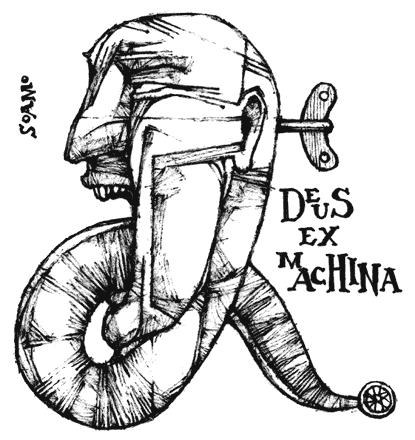
From Soamo Gallery
One thing that crane->skyhooks do is tell stories--
then question and revise the stories they tell.
As per the debate between Father Mike and Milt:
"That's how people, live...by telling stories...That's how we understand who we are, where we come from. Stories are everything. And what story does the church have to tell?...It's the greatest story every told."
"...in the old country people ..'ll believe whatever stories the priests tell them. Here it's different. You can go to college and learn to think for yourself. "
"The church doesn't want people not to think....thinking will take a person only so far. Where thinking ends, revelation begins."
"I'd say where thinking ends, stupidity begins."
My mother...couldn't fail to notice the stark contrasts....On one side, faith; on the other, skepticism (179).
In the concept of the "evolution of stories," have we found a way of "turning" this "stark contrast" into something more interactive--and more generative?
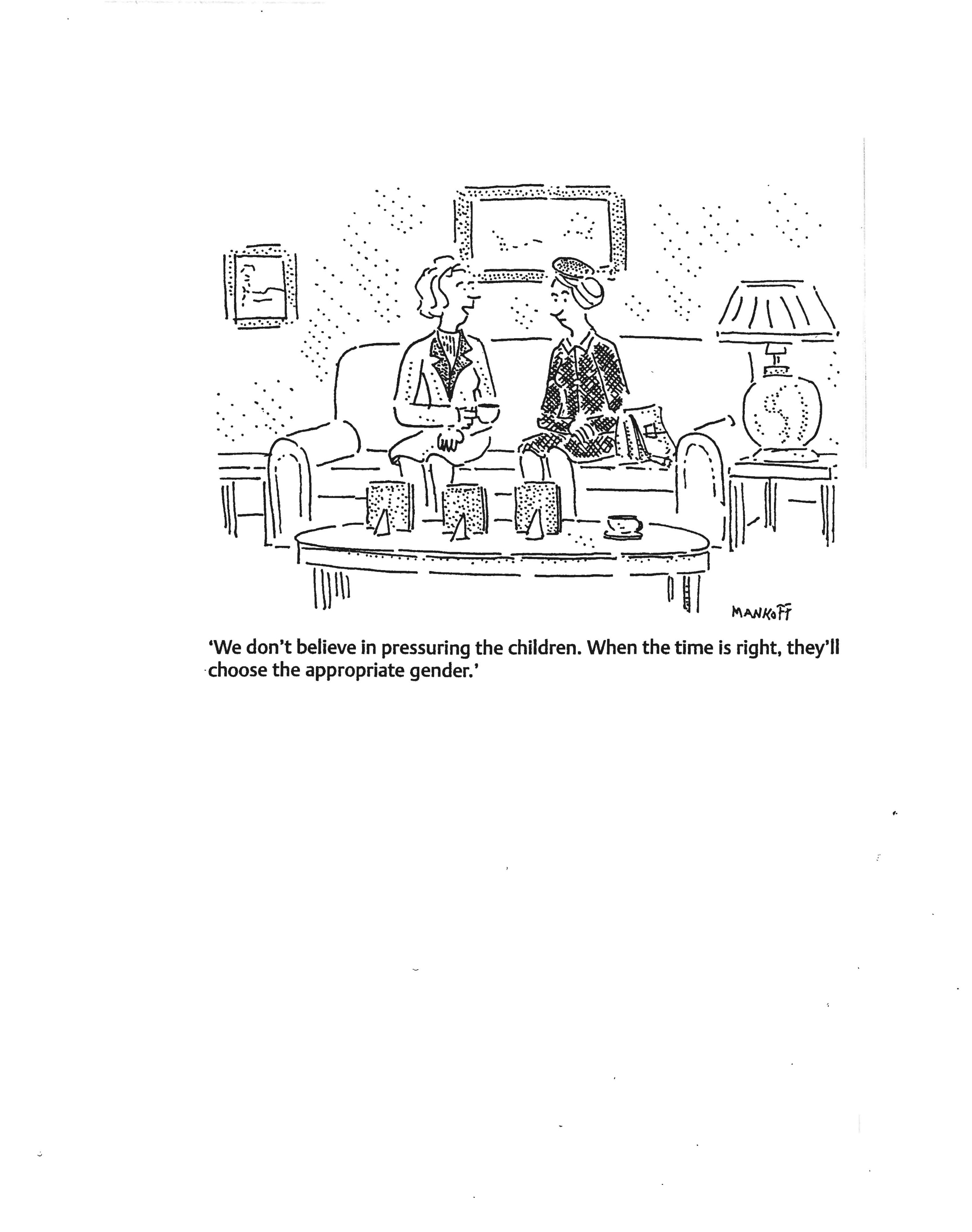
Jonathan Culler, Literary Theory: A Very Short Introduction (via Jessie)
Essentially...a plot requires a transformation. There must be an initial situation, a change ...and a resolution that marks the change as significant....there must be an end relating back to the beginning...that indicates what has happened to the desire that led to the events the story narrates (Culler 85).
...when he returned home from college after his freshman year my brother had become another person.....The members of my family have always had a knack for self-transformation....I suspect that Chapter Eleven's transformation was caused in no small part by that day...when his life was decided by lottery....Chapter Eleven...was trying to escape what he had dimly perceived...the possibility that not only his draft number was decided by lottery, but that everything was (317-318).
One of the things Cal acquires, in the course of the evolution of his mind,
is the ability to transform chance into pattern, the horrific into the positive,
to use a disintegrating universe to contruct a new one:

Grow up in Detroit and you understand the way of all things. Early on, you are put on close relations with entropy (517).
In my family, the funeral meats have always furnished the wedding tables. My grandmother agreed to marry my grandfather because she never thought she'd live to see the wedding. And my grandmother blessed my parents' marriage, after vigorously plotting against it, only because she didn't think Milton would survive to the end of the week (195).
"We're not going on vacation. There's a war!" (360)
[Callie is hit by a tractor, and wakes to] a beautiful sight. I saw the Object's face from below. My head was in her lap....for the first and last time, we kissed (394).
Cal is sometimes embarrased to admit that disaster can have positive effects:
Which leads me to a terrible confession...while the sun set melodramatically over a death that wasn't in the script, I felt a wave of pure happiness....I had the obscure Object in my arms (339).
Shameful as it is to say, the riots were the best thing that ever happened to us. Overnight we went from being a family desperatley trying to stay in the middle class to one with hopes of sneaking into...at least the upper-middle (252).
Britt called our attention to this phenomenon weeks ago:
I think we feel like we ought to act disturbed when we see such shocking images, but maybe that needn't be the case.
Cal's story is an argument that it "needn't be the case."
Does his insistant upward "turn" bother you (Britt, others)?
Cal presents the comedic as a deliberate re-writing of his ancestral genre, tragedy:
... strange infants born in the village...every few generations...always met with tragic ends....(117)
A real Greek might end of this tragic note. But an American is inclined to stay upbeat....Milton...got out just in time....before...the common tragedies of American life...[which] do not fit into this singular and uncommon record (511-512).

From Nice Cufflinks
Silently Tessie inserted the links, tragedy in one sleeve, comedy in the other...under the influence of those two-sided accessories, what happened next took on contrasting tones....Milton came face-to-face with the essence of tragedy, which is something determined before you're born, something you can't escape or do anything about, no matter how hard you try....But...there was a comic aspect to events that day, too....even a brand of harsh satire in my parents' quest itself, because it typified the American belief that everything can be solved....All this comedy, however, is retrospective (426).
It is based on the possibility of there always being an alternative, a choice.
It is both retrospective and futuristic, takes account of the past and looks into the future.
Annie:
I am still thinking about the "boxy-ness" or classification of gender....Maybe it comes back to this distinction between transformation and discovery....Discovery implies the pre-existence of something which one eventually notices, or finds. Transformation, conversely, is willing reinvention . . . an acted transition from one thing to another. When Callie says, "I am a man!" she calls upon the transformation of the self -- a reconstruction of identity.
Anjali: I don't have any sense for what "in between" a girl and a boy's voice would sound like. I don't have a sense for such a person. It's interesting how hard it is to develop a sense for a person that transcends gender. Gender plays such a large role in how I define people in my mind, and I'd never even noticed before...
Liz: ...people will place themselves in pre-constructed boxes rather than find individuality. I was annoyed that we kept trying to argue whther the author wrote in a female or male manner. Those are gross stereotypes and misconceptions.... I won't box people into a set of actions based on some preconcieved notion of gender....I thought that the lesson in this book was not that there should be a new box for some intermediate gender but rather that there should be no boxes at all.
Cal: My bodily metamorphosis was a small event....my family found that, contrary to popular opinion, gender was not all that important. My change from girl to boy was far less dramatic than the distance anybody travels from infancy to adulthood. In most ways I remained the person I'd always been (519-520).
Zora: "we're what's next" (490).
Jonathan Culler: The literary utterance...creates the state of affairs to which it refers... brings to centre stage...an active, world-making use of language....acts of language that transform the world, bringing into being the things that they name....what drives theory...is the desire to see how far an idea...can go....Theory does not give rise to harmonious solutions...but the prospect of further thought...theory is...an ongoing project of thinking which does not end (97-98, 122).
And everyone else...what are you thinking?
What are you building of this house of words?
What's next?
| Course Home Page
| Science in Culture
| Serendip Home |
Send us your comments at Serendip

© by Serendip 1994-
- Last Modified:
Wednesday, 02-May-2018 10:51:46 CDT

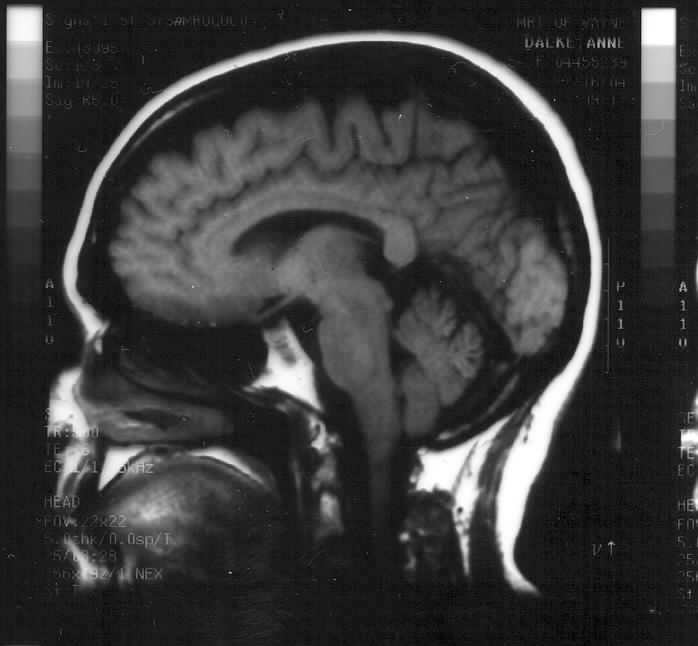

.JPG)


















